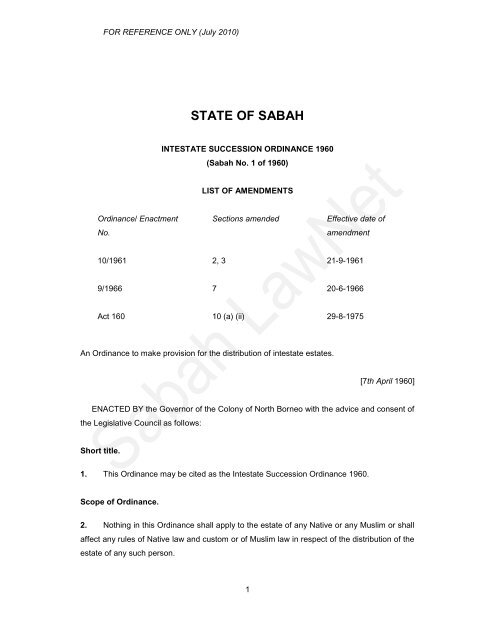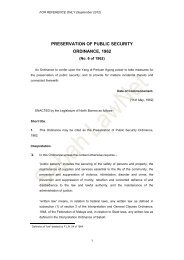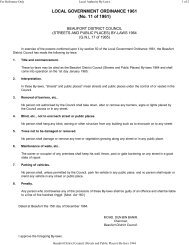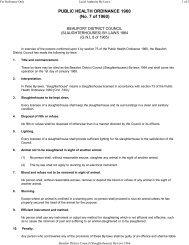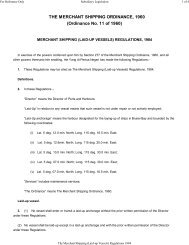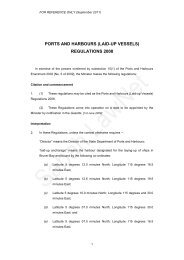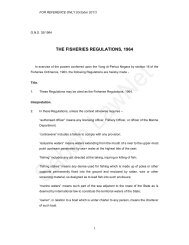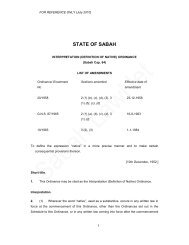Intestate Succession Ordinance 1960 - Sabah Lawnet
Intestate Succession Ordinance 1960 - Sabah Lawnet
Intestate Succession Ordinance 1960 - Sabah Lawnet
You also want an ePaper? Increase the reach of your titles
YUMPU automatically turns print PDFs into web optimized ePapers that Google loves.
FOR REFERENCE ONLY (July 2010)<br />
<strong>Ordinance</strong>/ Enactment<br />
No.<br />
STATE OF SABAH<br />
INTESTATE SUCCESSION ORDINANCE <strong>1960</strong><br />
(<strong>Sabah</strong> No. 1 of <strong>1960</strong>)<br />
LIST OF AMENDMENTS<br />
Sections amended Effective date of<br />
1<br />
amendment<br />
10/1961 2, 3 21-9-1961<br />
9/1966 7 20-6-1966<br />
Act 160 10 (a) (ii) 29-8-1975<br />
An <strong>Ordinance</strong> to make provision for the distribution of intestate estates.<br />
[7th April <strong>1960</strong>]<br />
ENACTED BY the Governor of the Colony of North Borneo with the advice and consent of<br />
the Legislative Council as folIows:<br />
Short title.<br />
1. This <strong>Ordinance</strong> may be cited as the <strong>Intestate</strong> <strong>Succession</strong> <strong>Ordinance</strong> <strong>1960</strong>.<br />
Scope of <strong>Ordinance</strong>.<br />
2. Nothing in this <strong>Ordinance</strong> shall apply to the estate of any Native or any Muslim or shall<br />
affect any rules of Native law and custom or of Muslim law in respect of the distribution of the<br />
estate of any such person.
FOR REFERENCE ONLY (July 2010)<br />
Interpretation.<br />
3. In this <strong>Ordinance</strong>-<br />
“child” means a legitimate child and where the deceased is permitted by his personal<br />
law a plurality of wives includes a child by any of such wives and includes any child<br />
adopted or registered as such under any written law for the being in force in <strong>Sabah</strong> ;<br />
“intestate” includes any person who leaves a will but dies intestate as to some<br />
beneficial interest in his property;<br />
“issue” includes children and the descendants of deceased children;<br />
“next-of-kin” means the next-of-kin (other than a descendant) computed according to<br />
the table of consanguinity in the Schedule;<br />
“personal chattels” mean horses, stable furniture and effects (not used for business<br />
purposes), motor cars and accessories (not used for business purposes), garden<br />
effects, domestic animals, plate, plated articles, linen, china, glass, books, pictures,<br />
prints, furniture, jewellery, articles of household or personal use or ornament, musical<br />
and scientific instruments and apparatus, wines, liquors and consumable stores, but do<br />
not include any chattels used at the death of the intestate for business purposes nor<br />
money or securities for money.<br />
Law regulating distribution.<br />
4. (1) The distribution of the movable property of a person deceased shall be<br />
regulated by the law of the country in which he was domiciled at the time of his death.<br />
(2) The distribution of the immovable property of a person deceased shall be<br />
regulated by this <strong>Ordinance</strong>, wherever he may have been domiciled at the time of his death.<br />
Property of an intestate to be distributed.<br />
5. Subject to the provision of the Administration of Native and Small Estates <strong>Ordinance</strong><br />
Throughout the <strong>Ordinance</strong> “<strong>Sabah</strong>” substituted for “Colony” and “North Borneo” by virtue of G.N.S. 87<br />
1965.<br />
2
FOR REFERENCE ONLY (July 2010)<br />
(Cap. 1.), after the commencement of this <strong>Ordinance</strong>, if any person shall die intestate, he<br />
being at the time of his death domiciled in <strong>Sabah</strong>, and being possessed beneficially of<br />
property, whether movable or immovable, or both, situated in <strong>Sabah</strong>, and, if any person shall<br />
die intestate, he being at the time of his death domiciled outside <strong>Sabah</strong> and being possessed<br />
beneficially of immovable property situated in <strong>Sabah</strong>, such property or the proceeds thereof,<br />
after payment thereout of the expenses of due administration as prescribed by the<br />
Administration of Native and Small Estates <strong>Ordinance</strong> [Cap. 1.] aforesaid or the Probate and<br />
Administration <strong>Ordinance</strong> [Cap. 109.],† as the case may be, shall be distributed among the<br />
persons entitled to succeed beneficially thereto.<br />
Persons held to be similarly related to deceased.<br />
6. For the purpose of distribution—<br />
(a) there shall be no distinction between those who are related to a person<br />
deceased through his father and those who are related to him through his<br />
mother nor between those who are actually born in his lifetime and those who at<br />
the date of his death were only conceived in the womb but who have<br />
subsequently been born alive; and<br />
(b) those related to a person deceased by the half blood shall rank immediately<br />
Rules for distribution.<br />
after those of the whole blood related to him in the same degree.<br />
7. In effecting such distribution the following rules shall be observed—<br />
RULE (1)<br />
If an intestate dies leaving a surviving spouse, no issue and no parent the<br />
spouse shall be entitled to the whole of the estate.<br />
Cap. 1 has been repealed by Act A 127 but not yet in force.<br />
† Cap. 109 has been repealed by Act 128 of 1972 but not yet in force.<br />
3
FOR REFERENCE ONLY (July 2010)<br />
RULE (2)<br />
If an intestate dies leaving a surviving spouse and issue the spouse shall be<br />
entitled to one-third of the estate.<br />
RULE (3)<br />
Subject to the rights of the surviving spouse, if any, the estate (both as to the<br />
undistributed portion and the reversionary interest) of an intestate who leaves<br />
issue shall be distributed by equal portions to and amongst the children of such<br />
person dying intestate and such persons as legally represent such children, in<br />
case any of the said children be then dead, save that where any child is or was<br />
a married woman the amount of her portion shall be reduced by the amount of<br />
any money or other property given, paid or settled by the intestate on account of<br />
her marriage.<br />
Proviso No. (1) — The persons who legally represent the children of an<br />
intestate are their descendants and not their next-of-kin.<br />
Proviso No. (2) — Descendants of the intestate to the remotest degree stand<br />
in the place of their parent or other ancestor, and take according to their stocks<br />
the share which he or she would have taken.<br />
RULE (4)<br />
If an intestate dies leaving a surviving spouse and no issue but a parent or<br />
parents the spouse shall be entitled to all the personal chattels of the estate and<br />
one half of the remaining property of the estate.<br />
RULE (5)<br />
If there are no descendants the parent or parents of the intestate shall take<br />
the estate, in equal portions if there be two parents, subject to the rights of the<br />
surviving spouse (if any) as in Rule (4) provided.<br />
4
FOR REFERENCE ONLY (July 2010)<br />
RULE (6)<br />
If there are neither surviving spouse, descendants, nor parents, the brothers<br />
and sisters, or children of brothers or sisters of the intestate shall share the<br />
estate in equal portions between the brothers and sisters and the children of any<br />
brother and sister shall take according to their stocks the share which he or she<br />
would have taken.<br />
RULE (7)<br />
If there are no surviving spouse, descendants, parents, brothers and sisters<br />
but grand-parents of the intestate the grand-parents shall take the whole of the<br />
estate in equal portions.<br />
RULE (8)<br />
If there are no surviving spouse, descendants, parents, brothers and sisters or<br />
their children or grand-parents but uncles and aunts of the intestate the uncles<br />
and aunts shall take the whole of the estate in equal portions.<br />
RULE (9)<br />
In all other cases, the estate shall go to the next-of-kin, ascertained in<br />
accordance with the table in the Schedule, computing up from the intestate to<br />
the common ancestor and then down again to the claimant, the next-of-kin of<br />
equal degree sharing equally inter se.<br />
RULE (10)<br />
In default of distribution under the foregoing Rules the Government of <strong>Sabah</strong><br />
shall be entitled to the whole of the estate.<br />
Special provision if the intestate leaves lawful widows.<br />
8. If any person so dying intestate be permitted by his personal law a plurality of wives,<br />
and shall leave surviving him more wives than one, such wives shall share among them<br />
5
FOR REFERENCE ONLY (July 2010)<br />
equally the share that the wife of the intestate would have been entitled to, had such intestate<br />
left one wife only surviving him.<br />
Children’s advancements not to be taken into account.<br />
9. Subject to the provisions of Rule (3) of section 7 where a distributive share of the<br />
property of a person dying intestate is claimed by a child or any descendant of a child of such<br />
person no money or other property which the intestate may during his life have given, paid or<br />
settled to or for the advancement of the child by whom or by whose descendant the claim is<br />
made shall be taken into account in estimating such distributive share.<br />
Amendment of the Administration of Native and Small Estates <strong>Ordinance</strong>.<br />
10. The Administration of Native and Small Estates <strong>Ordinance</strong>* [Cap. 1.] is amended—<br />
(a) in section 2 thereof—<br />
(i) by inserting immediately after the word “native” in the second line of the<br />
definition of the expression “native estate” the words “or of a deceased<br />
Muslim subject to the jurisdiction of a Native Court under paragraph (c) of<br />
subsection (1) of section 5 of the Native Courts <strong>Ordinance</strong>”* [Cap. 86.]; and<br />
(ii) by deleting the symbol and figure “RM3,000” which occurs in the second<br />
line of the definition of the expression “small estate” and by substituting<br />
therefor the symbol and figure “RM5,000”.<br />
†(b) by repealing subsection (1) of section 10 and substituting therefor the following<br />
subsection—<br />
“(1) After hearing the application the Collector shall, wherever possible,<br />
make an order for distribution and in making such order shall give effect to any<br />
division of the estate agreed on by any surviving spouse, issue and parents and<br />
shall, where no such agreement exists—<br />
* Cap. 1 has been repealed by Act A 127 but not yet in force.<br />
* Cap. 86 has been repealed by Enactment No. 3 of 1992.<br />
† See Ord. No. 8 of 1961.<br />
6
FOR REFERENCE ONLY (July 2010)<br />
Amendment Wills <strong>Ordinance</strong>, Cap. 158.<br />
(a) in the case of a native or a Muslim, distribute the estate<br />
according to the law or custom having the force of law<br />
applicable to the deceased; and<br />
(b) in any other case, distribute the estate according to the will of<br />
the deceased, or if there be no will, distribute the estate in<br />
accordance with the <strong>Intestate</strong> <strong>Succession</strong> <strong>Ordinance</strong>, <strong>1960</strong>”.<br />
11. Subsection (2) of section 1 of the Wills <strong>Ordinance</strong> is amended by inserting immediately<br />
after the word “Muslims” in the first line thereof the words “subject to the jurisdiction of the<br />
Native Courts under paragraph (c) of subsection (1) of section 5 of the Native Courts<br />
<strong>Ordinance</strong>” [Cap. 86.].<br />
Amendments of Procedure <strong>Ordinance</strong>, 1926.<br />
12. Section l4 of the Procedure <strong>Ordinance</strong>, l926 (First Schedule to Revised Edition of Laws<br />
<strong>Ordinance</strong>.), is amended by deleting the comma after the words “public policy” therein and by<br />
deleting the words and comma “and claims in intestacy shall be determined by the racial law<br />
of the deceased,”.<br />
Saving.<br />
13. (1) Notwithstanding any provision in this <strong>Ordinance</strong> to the contrary where any<br />
intestate of the Chinese race was born in China and established a domicile of choice in North<br />
Borneo before the fifteenth day of July, 1946, the Administrator-General may, if he is satisfied<br />
that the surviving spouse, issue and any parent desire the estate to be distributed in<br />
accordance with the racial law of the deceased, by order, authorise the distribution of such<br />
estate in accordance with the law of China governing distribution of intestate estates on the<br />
said fifteenth day of July, 1946.<br />
(2) In this section the term “Administrator-General” means any person appointed<br />
Administrator-General under subsection (1) of section 27 of the Probate and Administration<br />
Cap. 86 has been repealed by Enactment No. 3 of 1992.<br />
7
FOR REFERENCE ONLY (July 2010)<br />
<strong>Ordinance</strong> [Cap. 109.] .<br />
Great Grandfather's<br />
Father<br />
(4)<br />
Great<br />
Grandfather<br />
(3)<br />
Grandfather<br />
(2)<br />
Father<br />
(1)<br />
The<br />
<strong>Intestate</strong><br />
Son<br />
(1)<br />
Grandson<br />
(2)<br />
Great<br />
Grandson<br />
(3)<br />
Brother<br />
(2)<br />
Uncle<br />
(3)<br />
Great Great Uncle<br />
(5)<br />
Great Uncle<br />
(4)<br />
SCHEDULE<br />
TABLE OF CONSANGUINITY<br />
Cousin German<br />
(4)<br />
Nephew<br />
(3)<br />
Great Uncle's<br />
Son<br />
(5)<br />
Note:— In this table the degrees are shown up to the sixth. Degrees beyond this can be ascertained by<br />
Cap 109 has been repealed by Act 128 of 1972 but not yet in force.<br />
8<br />
Son of Cousin<br />
German<br />
(5)<br />
Son of Nephew<br />
(4)<br />
Second Cousin<br />
(6)<br />
Grandson of Cousin<br />
German<br />
(6)
FOR REFERENCE ONLY (July 2010)<br />
extending the table.<br />
To ascertain the degree of consanguinity compute from the intestate to the common ancestor<br />
and down to the claimant each step forming one degree.<br />
9


